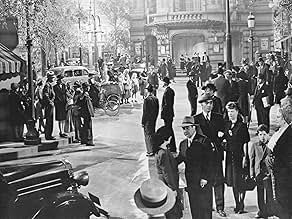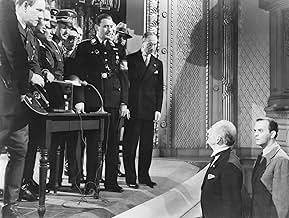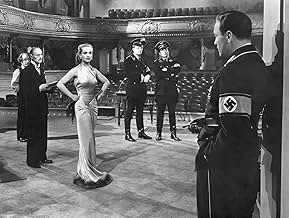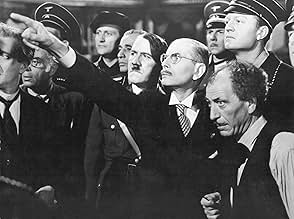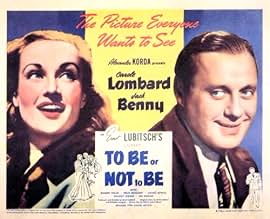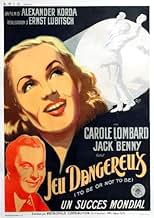Während Polen von den Nazis besetzt ist, versucht eine Theatertruppe einem polnischen Soldaten dabei zu helfen, einen deutschen Spion aufzuspüren.Während Polen von den Nazis besetzt ist, versucht eine Theatertruppe einem polnischen Soldaten dabei zu helfen, einen deutschen Spion aufzuspüren.Während Polen von den Nazis besetzt ist, versucht eine Theatertruppe einem polnischen Soldaten dabei zu helfen, einen deutschen Spion aufzuspüren.
- Regie
- Drehbuch
- Hauptbesetzung
- Für 1 Oscar nominiert
- 5 Gewinne & 2 Nominierungen insgesamt
- Polish RAF Pilot
- (Nicht genannt)
- German Soldier
- (Nicht genannt)
- Member of Audience at Performance of Hamlet
- (Nicht genannt)
Zusammenfassung
Empfohlene Bewertungen
Found 'To Be or Not to Be' a truly fabulous film, have seen many very good to masterpiece films recently (as well as inevitably some duds) and this stands out among the very best of them. What could easily have been tasteless and offensive, with what it was satirising and considering the time, turned out to be one of the funniest comedies seen recently and ever actually and wartime comedies have seldom been funnier or more original. It also contains some of the best work of all involved. In front of and behind the camera, am aware that sounds very cliched but to me it's true.
'To Be or Not to Be' looks great, immaculately yet atmospherically designed with a real sense of period and beautifully shot without being too glamorous. The music is neither too jaunty or low key, while Lubitsch's direction is one of 'To Be or Not to Be's' biggest stars in its sophisticated style that one can recognise from anywhere.
Regarding the script, it is intricate and full of sharp wit and hilariously quotable lines that as mentioned above in my first paragraph when talking about the material being daring. The opening gag is hysterical and one that one does not expect, while the running joke concerning Robert Stack as Maria's (played by Lombard) admirer is an example of a running joke that doesn't get old prematurely and doesn't get repetitive, dangers with running jokes. 'To Be or Not to Be' is not just non-stop hilarity though, there is also surprising pathos that one doesn't always get in comedy and is genuinely poignant. Affectionate and inspiring are further things to describe and never had any problem with the pace.
Lubitsch's direction is one of two particularly wonderful things about 'To Be or Not to Be'. The other is the simply sublime cast, showing Jack Benny at his funniest and Lombard being an absolute joy in all senses (found her touching too but a lot of it was to do with it being her final film and what a talent she was). Stack is amusing and charming and Stanley Ridges and Sig Ruman are great fun.
Altogether, fabulous. Even in films that fit in the "loved it" category, improvements can be pointed out in order to be balanced, but in the case of 'To Be or Not to Be' there is nothing to fault. 10/10
A cracking comic-caper, it follows a troupe of Polish actors who find themselves performing the roles of their lives- not on stage, but in Nazi-occupied Warsaw. When a young pilot is caught up in a spy plot, the troupe leaps into action, donning disguises, bluffing Gestapo officers and improvising as if their lives (and country) depend on it. At the centre is Benny's Joseph Tura, the pompous Hamlet-in-residence, and Lombard, as his wife Maria, luminous and quick-witted in what was sadly her final screen role.
The film effortlessly juggles tones. One moment it's pure farce- theatrical egos, slippery identities and a Hamlet with more flair than sense- and the next, it glances at real peril with a surprisingly steady gaze. Beneath the laughs, there's a pointed satire about authoritarianism, vanity and the roles people play to survive. The dialogue crackles with razor-sharp wit, every line balanced like a dagger on the edge of a laugh. Whether it's Benny's oblivious grandiosity or Lombard's wry deflections, Lubitsch keeps the script dancing- light on its feet, but never light on substance.
That Lubitsch made this film at the height of the Second World War is nothing short of astonishing. While Hollywood largely played it safe, he aimed straight for the absurd heart of fascism, daring to laugh. But this isn't mockery for its own sake- Lubitsch understood that ridicule, when wielded with precision, can be a subversive weapon. His satire is never cruel, but it is fearless: mocking vanity, the ridiculousness of the Nazi ideology, exposing cowardice; reminding us that even in the darkest times, a well-delivered line- or a perfectly timed pause- can carry a kind of truth that outlasts bombs and bluster.
Visually, the film is no slouch either. The production design conjures a grand theatrical world, full of velvet curtains, dressing rooms and shadowy corridors. Rudolph Maté's cinematography adds a crisp elegance, framing scenes with the same precision Lubitsch brings to the dialogue. It's handsome without being showy, stylish without upstaging the script; perfectly suited to the unfolding farce.
The cast is uniformly excellent, but it's Benny and Lombard who give the film its centre of gravity- or, rather, its comic orbit. Benny, one of the all-time comedic greats, leans gleefully into Joseph Tura's preening vanity, delivering a performance that's both absurd and oddly endearing. He plays a man desperate to be taken seriously, even as the world refuses to play along- a joke that never stops landing.
Lombard, by contrast, is all grace and mischief. Her Maria is a master of timing, charm and quiet control. She brings a knowing sparkle to every scene she's in. Sadly, Lombard would die before the film finished post-production- in this way it acts as a sterling swansong for a cinematic legend. Around them, the supporting players- from Sig Ruman's delightfully blustering colonel to Robert Stack's earnest pilot- flesh out a world where everyone, it seems, is playing to the gallery, even when the stakes are deadly.
Ernst Lubitsch's 'To Be or Not to Be' is a marvel- a film daring to be funny when all signs point to despair. It's sharp, silly and strangely stirring, a comedy that looks evil in the face and responds with a raised eyebrow and a perfectly arched punchline. In a world too often content to play it safe, Lubitsch reminds us that the boldest laughs are the ones that speak the hardest truths. Strongly acted and beautifully shot, 'To Be or Not to Be' ultimately proves that in the face of tyranny, the best answer is always to be- to laugh, to fight and to defy.
Lubitsch grew up in Berlin and became an acting sensation after World War I before becoming one of the most promising directors of Hollywood. A precocious talent with a sense of sophistication that would be known as the 'Lubitsch touch', he was probably under the influence of that boost of creativity and flamboyance that made Berlin an artistic Mecca in the early 30s (like in Bob Fosse's "Cabaret"). His film opens on Warsaw, a more suitable place for free art once Germany surrendered to swastikas. And as if he anticipated the criticism over his subject, the story features a play named "The Gestapo" and satirizing the Nazis. During a rehearsal, the man playing Hitler (Irish actor Tom Dugan) delivers a hilarious and unexpected "Heil myself". The line gets cut by the director who makes it a matter of ethics not to make Nazis funny, much to the actor's reluctance.
Basically, Lubitsch asks us the question: should we sacrifice a good line for the sake of seeming decency? How many times haven't we felt the necessity to cross the barrier of good taste because it was so tempting. So the line is censored because of the risk of offending Hitler and when the Germans come on a day of September 1939, the play is cancelled once and for all. The situation resonates like Churchill's parable about war and dishonour, fearing the Nazis is the dishonourable attitude, even when meant to play safe, you're never safe with them, so let's just use your best weapon, guns or gags it doesn't matter. While I was wondering if Lubitsch would have been as loose on the Nazis if he knew about the Camps, I was hiding a chuckle because the line "so they call me Concentration Camp Ehrhardt" kept springing to my mind. Should I feel guilty?
No less than for any movie that dared to turn the subject into laughing matter, from Donald Duck's "Der Fuerher's Face" to "La Vita e Bella". It's because Nazis were human that their crimes were horrific, it's because they were human that they should be mocked. Art is the triumph of the intellect over the brutal force, the sensitivity over cynicism, it can be sophisticated and fancy but it can't really do without powerful sentiments, this is why the film makes a good use of Shakespeare's lines (borrowed from "Hamlet" and "The Merchant of Venice") and even more why it focuses on a married couple, the greatest actress of Poland Maria Tura (Carole Lombard) and her hammy husband Joseph (Jack Benny). The film opens with a sort of vaudevillian mood where Maria exploits her husband's "Hamlet" soliloquy to bring the handsome aviator Sobinski (Robert Starck) to her room, the running gag is not overused so Marie doesn't appear too cheap and Joseph too dumb.
There's a fine balance between the romance and the screwball situations and they all get along with the intricacies of a plot that involves a sinister but seductive spy named Professor Siletski (Stanley Ridges), who proposes Maria to become an agent. Meanwhile, the troop must absolutely capture the man, confiscate the documents that contain names of Polish Resistant members and get rid of the spy, and this is where their Nazi costumes get quite handy. So we see Jack benny and all his friends impersonating Nazi officers and even Selitski with variable effects, sometimes with the right timing, sometimes a delay force them to rewrite the script. In a sort of meta-referential nod to his own art, Lubitsch directs actors playing directors, actors and writers, proving that sometimes a good act can be a matter of life and death. Hammy too much and your cover is blown if not your head. Maria proves to be a more restrained actress so she can dodge the Nazis' flair, same can't be said about Joseph and Benny's antics endanger the film's credibility in their exaggerated audacity, the man pushes his luck so often it's a wonder how he did survive.
The film also suffers from a series of contrivances that happen all too conveniently near the end leading to a rushed climax only redeemed by the hilarious ending. Still, the real black spot in the film's legacy is of course the haunting of Carole Lombard's memory. The actress died in a plane crash a few weeks after the film's release, the USA had just entered the war and she was collecting bonds during a tour across America. In a way, she was a victim of that war though she lived far from the ruins and ashes of Poland, her death cut one of the most promising careers short and made Gable so inconsolable he joined the war too... I avoided that film for a long time because of that story, it had saddened me a lot even more because I happen to be afraid of flying.
I couldn't believe how many times she referred to flights during the film, the simple fact that she loved an aviator gives it an eerie feeling, it's just as if the film was doomed to be clouded by tragedy, individual and universal. However, and that might be the secret of "To Be or Not to Be", It's all fiction, it's not reality, the film was criticized when the war was still raging and now it's a classic, once reality is as dead as fiction, what remains is the essence of art.as
Wusstest du schon
- WissenswertesWhen Jack Benny's father went to see this movie, he was outraged at the sight of his son in a Nazi uniform in the first scene and even stormed out of the theater. Jack convinced his father that it was satire, and he agreed to sit through all of it. His father ended up loving the film so much he saw it forty-six times.
- PatzerAlthough having Maria Tura give the cue line "To be or not to be" to the men in the audience she wishes to meet in her dressing room is a very funny premise of the film, it actually would be highly impractical for Maria to think she would have time to meet backstage. Hamlet's "To be or not to be" soliloquy is only about 3-4 minutes long and Ophelia has the very next line in the play (in fact Hamlet announces her entrance at the end of his soliloquy), which would barely give Maria any time to meet men in her dressing room.
- Zitate
Joseph Tura: [disguised as Professor Siletsky - speaking about Maria Tura] Her husband is that great, great Polish actor, Josef Tura. You've probably heard of him.
Colonel Ehrhardt: Oh, yes. As a matter of fact I saw him on the stage when I was in Warsaw once before the war.
Joseph Tura: Really?
Colonel Ehrhardt: What he did to Shakespeare we are now doing to Poland.
- Alternative VersionenIn Poland, a brief introduction was edited in. Polish actor Kazimierz Rudzki assured the audience that the movie was done with best intentions by their "American friends". At the time the movie screened in Poland, many people still lived in trauma from the events of World War II; few could find comedy in the German invasion of Poland, instead finding the movie in poor taste, offensive, or hard to swallow.
- VerbindungenFeatured in Showbiz Goes to War (1982)
- SoundtracksPolonaise in A major, Op. 40, No. 1, 'Military'
(1838) (uncredited)
Written by Frédéric Chopin
Orchestral arrangement by Aleksandr Glazunov
Heard during the opening and closing credits
Top-Auswahl
- How long is To Be or Not to Be?Powered by Alexa
Details
Box Office
- Bruttoertrag in den USA und Kanada
- 3.270.000 $
- Weltweiter Bruttoertrag
- 4.578.000 $
- Laufzeit1 Stunde 39 Minuten
- Farbe
- Seitenverhältnis
- 1.37 : 1
Zu dieser Seite beitragen


